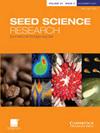Seed dormancy break and germination by a rare relict of the Würmian glaciation in the Iberian Peninsula: Euonymus latifolius (Celastraceae)
IF 1.9
3区 生物学
Q2 PLANT SCIENCES
引用次数: 0
Abstract
Southern European peninsulas have repeatedly played notable roles as refuges in the natural history of flora during periods of glaciation. Euonymus latifolius (Celastraceae) is a relict species from the last Würmian glaciation in the Iberian Peninsula. It still lives with isolated populations in favourable, cool mountainous microhabitats, being an extremely rare, critically endangered species. These Iberian populations are often high-priority targets for conservation due to their long-term persistence and unique evolutionary trajectory. Previously, it has not been feasible to promote significant programmes for reintroduction and/or population reinforcement of this singular plant species due to the great difficulties of conventional propagation. In this study, we analysed the effects of temperature, light and gibberellic acid (GA3) on the germination responses of E. latifolius to develop an effective protocol for seed germination as a main outcome. The results are coherent with the climatic temperature conditions recorded broadly in the Iberian Peninsula in the past and in the current refuge locations for the taxon. The germination responses of E. latifolius are compatible with those of seeds with intermediate physiological dormancy. In particular, the seeds required a 10-week warm period (20/7°C + 15/4°C) followed by 20 weeks of cold period (5 + 1.5°C) to break dormancy and achieve germination values over 90%. GA3 also promoted germination (80%). Therefore, we developed the first effective protocol for promoting E. latifolius seed germination and, thus, sexual propagation, to facilitate urgent ex situ actions in the current climate change context.伊比利亚半岛一种罕见的w rmian冰期遗迹的种子休眠和萌发:卫矛(Celastraceae)
在冰川作用时期,南欧半岛在植物群的自然史上多次扮演着重要的避难所角色。卫矛(卫矛科)是伊比利亚半岛最后一次瓦尔米亚冰川作用的遗迹物种。它仍然与孤立的种群生活在有利、凉爽的山区微栖息地,是一种极为罕见、极度濒危的物种。由于这些伊比利亚种群的长期存在和独特的进化轨迹,它们往往是保护的高度优先目标。以前,由于传统繁殖的巨大困难,推动重新引入和/或加强这种单一植物物种种群的重大计划是不可行的。在本研究中,我们分析了温度、光照和赤霉酸(GA3)对宽叶银耳的发芽反应的影响,以制定一种有效的种子发芽方案作为主要结果。这一结果与伊比利亚半岛过去和目前该分类单元避难地点广泛记录的气候温度条件一致。latifolius的发芽反应与具有中等生理休眠的种子的发芽反应是一致的。特别是,种子需要10周的温暖期(20/7°C+15/4°C),然后是20周的寒冷期(5+1.5°C)才能打破休眠并达到90%以上的发芽率。GA3也促进发芽(80%)。因此,我们制定了第一个有效的方案来促进宽叶银耳的种子发芽,从而促进性繁殖,以促进在当前气候变化背景下的紧急迁地行动。
本文章由计算机程序翻译,如有差异,请以英文原文为准。
求助全文
约1分钟内获得全文
求助全文
来源期刊

Seed Science Research
生物-植物科学
CiteScore
3.60
自引率
4.80%
发文量
23
审稿时长
>12 weeks
期刊介绍:
Seed Science Research, the official journal of the International Society for Seed Science, is a leading international journal featuring high-quality original papers and review articles on the fundamental aspects of seed science, reviewed by internationally distinguished editors. The emphasis is on the physiology, biochemistry, molecular biology and ecology of seeds.
 求助内容:
求助内容: 应助结果提醒方式:
应助结果提醒方式:


